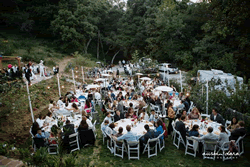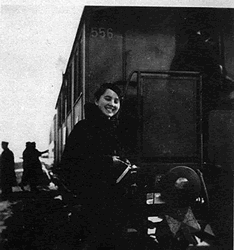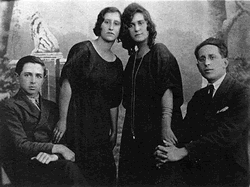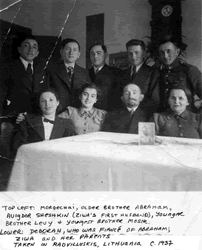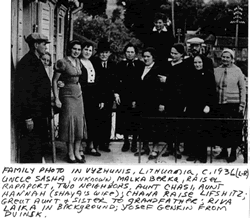Ziwa Alexander Katz, Holocaust survivor
|
|
Ziwa Alexander Katz, Holocaust survivor 1. Ziva's first wedding.
Katz, of Minnetonka, died Dec. 16 after a remarkable life journey. She was 94. For many years Katz didn't speak of her early life, said her son Joe Alexander of Edina. "After the passage of about 40 years, the experience was far enough behind her, and then you couldn't keep her quiet," he said. "She wanted people to understand that things like this that were happening out in the world shouldn't happen again." Katz was born in 1916 in Vyzounos, Lithuania. In 1941, she was living in nearby Kovno with her husband, Victor, and toddler daughter, Aviva. That year, the Germans invaded her hometown and killed her parents, four brothers and extended family ( they were killed in Shavli). She and her husband were relegated to the Jewish ghetto in Kovno, and forced to work for minimum rations, Joe Alexander said. One day when the able-bodied returned from working, they found all of the old people and children were gone, including Aviva, who was 2 years old. As the war was ending, the Jews were rounded up and sent to Sutthof concentration camp, near Danzig, Poland. Katz was separated from her husband. She never saw him again. Desperately ill with typhus, she had fainted while digging foxholes for German soldiers at Sutthof when the Red Army liberated the camp. Loath to touch sick inmates, Soviet soldiers poked inert bodies with sticks. Miraculously, Katz responded to the touch, her son said. She woke up in a Russian hospital. After recuperating, Katz and other survivors were loaded into railroad boxcars to go work in Siberia, "payment" to the Soviets for their rescue. But at a rest stop, she and a few others hid in a nearby forest until the train left. Katz made her way to western Germany. After the war, she taught Hebrew to children preparing to emigrate to Israel. She fell in love with a physician who had lost his wife in the Holocaust. They were preparing to marry when his wife reappeared, Katz's son said. Katz later married the physician's friend Hyme Alexandrowitz. They came to the United States in 1950 and became citizens in 1955, changing their name to Alexander, her son said. They raised two sons in St. Louis Park. Katz was a devoted mother, part of which Joe Alexander attributes to her early losses. "We were the center of her life, and she did whatever she could to make us successful," he said. "I think she lost so much that when she did ultimately have a family, my father and brother and I, she was extremely dedicated to us." She also volunteered at Beth El Synagogue in St. Louis Park, teaching Hebrew, mentoring converts, leading prayers, doing fundraising and anything else that needed to be done, into her late 80s. Hyme Alexander died in 1969. In the late 1970s, she reconnected with the physician, Nachum Katz, whose wife also had died. They married within a year, Joe Alexander said. Katz died in 1992. Besides her son Joe, Katz is survived by her other son, Neil Alexander of Ann Arbor, Mich., and six grandchildren. |
